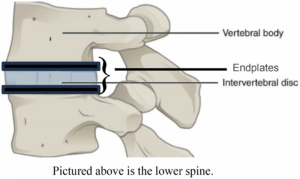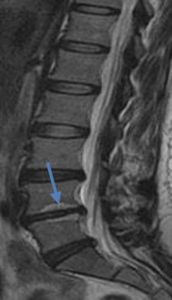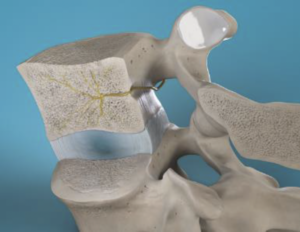What is Basivertebral Nerve Ablation?
 Basivertebral nerve ablation is a minimally invasive procedure used to reduce vertebrogenic pain (i.e. low back bone pain), caused by damage of the endplates of vertebral bodies. The vertebral endplates are structures that line the top and bottom of each vertebral body, serving as a barrier between a spinal disc and the vertebrae above it. The endplates are innervated by the basivertebral nerve, which lies within the vertebrae. The basivertebral nerve sends pain signals in response to endplate damage. During basivertebral nerve ablation, radiofrequency energy is used to create a lesion in the basivertebral nerve, which prevents the nerve from effectively sending pain signals and results in a decrease in your pain.
Basivertebral nerve ablation is a minimally invasive procedure used to reduce vertebrogenic pain (i.e. low back bone pain), caused by damage of the endplates of vertebral bodies. The vertebral endplates are structures that line the top and bottom of each vertebral body, serving as a barrier between a spinal disc and the vertebrae above it. The endplates are innervated by the basivertebral nerve, which lies within the vertebrae. The basivertebral nerve sends pain signals in response to endplate damage. During basivertebral nerve ablation, radiofrequency energy is used to create a lesion in the basivertebral nerve, which prevents the nerve from effectively sending pain signals and results in a decrease in your pain.
Candidacy for Procedure
 Basivertebral nerve ablation is used to treat vertebrogenic pain, a type of chronic low back pain that results from damage to the vertebral endplates. This usually occurs from everyday wear and tear; however, increased risk factors for vertebral damage include physically strenuous occupations, older age, and a history of low back issues. Physicians can diagnose vertebrogenic pain using MRIs to evaluate for modic changes (blue arrow), which are changes of the vertebral endplates. Patients describe vertebrogenic pain as midline pain, most commonly presenting as aching. This pain tends to worsen with physical activities including prolonged sitting, bending, and lifting.
Basivertebral nerve ablation is used to treat vertebrogenic pain, a type of chronic low back pain that results from damage to the vertebral endplates. This usually occurs from everyday wear and tear; however, increased risk factors for vertebral damage include physically strenuous occupations, older age, and a history of low back issues. Physicians can diagnose vertebrogenic pain using MRIs to evaluate for modic changes (blue arrow), which are changes of the vertebral endplates. Patients describe vertebrogenic pain as midline pain, most commonly presenting as aching. This pain tends to worsen with physical activities including prolonged sitting, bending, and lifting.
The Procedure
 Basivertebral nerve ablation is a same-day outpatient procedure that involves radiofrequency ablation of the basivertebral nerve. The procedure is implant-free, preserves spinal structure, and requires a brief recovery period.
Basivertebral nerve ablation is a same-day outpatient procedure that involves radiofrequency ablation of the basivertebral nerve. The procedure is implant-free, preserves spinal structure, and requires a brief recovery period.
Under X-ray guidance, a probe is inserted into front of the spine (i.e. vertebral body) and placed at the trunk of the basivertebral nerve. Then, the nerve is heated via radiofrequency energy that is transmitted to the electrode tip of the probe. This heating process lesions the basivertebral nerve, reducing the transmission of pain signals. After the ablation, the probe is removed, and the procedure is complete.
It can take up to 4 to 6 weeks to experience the pain reduction benefit from basivertebral nerve ablation. However, many patients begin to experience relief earlier.
Safety Profile and Clinical Outcomes
Basivertebral nerve ablation is a minimally invasive and implant-free procedure with a strong clinical efficacy and safety profile. Following the basivertebral nerve ablation, there is a less than 0.2% rate of serious adverse events reported. Furthermore, randomized controlled trials have shown a very low rate of device or procedure-related complications.
These studies have also proven basivertebral nerve ablation to be an effective treatment when compared to placebos and other standard non-surgical procedures. Clinical outcomes of basivertebral nerve ablation include:
- Consistent and sustained pain relief, including patient-reported relief after 5 years.
- Overall decrease in disability related to low back pain.
- Decrease in the need for other interventional treatments.
- High degrees of patient-reported satisfaction with the procedure.
Results of the basivertebral nerve ablation may last up to five years, and the procedure can be repeated if the pain returns.
References
1. Fischgrund J, et al. Long-term outcomes following intraosseous basivertebral nerve ablation for the treatment of chronic low back pain: 5-year treatment arm results from a prospective randomized double-blind sham-controlled multi-center study. Eur Spine J. 2020.
2. Fischgrund JS, et al. Intraosseous basivertebral nerve ablation for the treatment of chronic low back pain: 2-year results from a prospective randomized double-blind sham-controlled multicenter study. Int J Spine Surg. 2019.
Interested in Clinical Research?
Pain Diagnostics and Interventional Care’s Clinical Research Department is driven to further the science of Pain Medicine to bring our patients the most up to date and effective treatment options. We are currently enrolling patients for studies regarding low back pain. If you are interested in learning more, let us know!
Medical Advice Disclaimer
The information, including but not limited to, text, graphics, images, and other material contained on the newsletter are for informational purposes only. No material is intended to be a substitute for professional medical advice, diagnosis, or treatment. Always seek the advice of your physician or other qualified healthcare provider with any questions you may have or prior to beginning an exercise program.
Contact form
Or just call (412) 221-7640 and we’ll do everything we can to help.
Across all review platforms
Dr. David Provenzano, a leading expert throughout the nation for treating patients who suffer daily from pain, uses advanced diagnostic techniques to assess the source of the pain and develop a comprehensive and safe treatment approach that can significantly reduce your pain.

